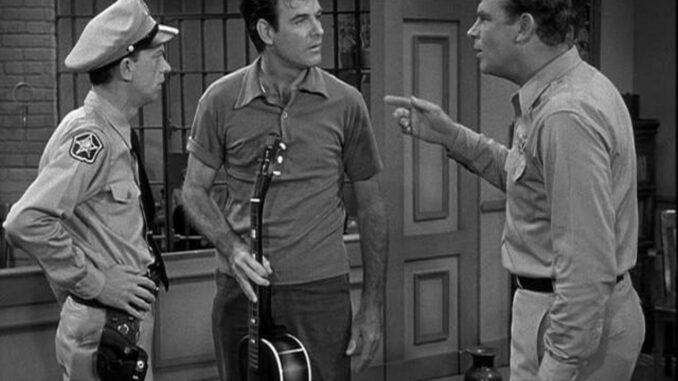
The Six Strings and the Soul of Mayberry: How Silas Won Their Hearts
Mayberry, North Carolina, wasn’t exactly known for its vibrant musical scene. Life moved at a gentle pace, punctuated by the chirping of crickets, the clatter of Opie’s marbles, and the comforting hum of Floyd’s barber shop. Bluegrass and gospel filled the Sunday air, but anything more daring was considered, well, a tad too sophisticated for a town that valued tradition above all else. That is, until Silas arrived.
Silas wasn't from around these parts. He wasn't a farmer, a shopkeeper, or a deputy. He was a drifter, a vagabond poet armed with a battered guitar and eyes that held the stories of a thousand miles. He showed up one sweltering August afternoon, his denim jacket dusty, his boots worn thin, and set himself up on the town square bench. At first, Mayberry eyed him with cautious curiosity. Barney Fife, naturally, saw him as a potential rabble-rouser, a harbinger of unwelcome change. Andy, ever the pragmatic peacemaker, simply observed.
Then Silas began to play.
The notes that flowed from his guitar weren't the familiar tunes of Mayberry. This was something different, something… richer. His fingers danced over the fretboard, coaxing out melodies that spoke of wide-open spaces, lost loves, and the quiet beauty of a lonely sunset. He sang in a voice raspy but soulful, a voice that resonated with the collective longings hidden beneath Mayberry's placid surface. He sang of heartache and hope, of the dreams that lived in the margins, and the bittersweet understanding of a life lived on the road.
The first few songs drew a small crowd. Floyd, lured by the promise of a distraction from his tedious haircuts, leaned against the doorway of his shop. Opie, mesmerized by the intricate fingerpicking, abandoned his game of marbles. Even Barney, despite his initial skepticism, found himself tapping his foot in time to the music.
As Silas played, something shifted in the air of Mayberry. It wasn't a dramatic upheaval, but a subtle softening, a quiet opening of hearts. His music didn't challenge their values, but rather illuminated them from a different perspective. He sang about the importance of kindness, the enduring power of family, and the solace found in simple things – values that were already deeply ingrained in the fabric of Mayberry. He just expressed them in a way they hadn't heard before.
He didn't preach or pontificate. He simply told stories with his music. He sang about a farmer who lost his land but found strength in his family. He sang about a young woman who dreamed of leaving her small town but ultimately discovered the beauty of home. These were stories Mayberry could relate to, stories that mirrored their own lives, their own struggles, and their own hidden aspirations.
Silas wasn't trying to change Mayberry. He was simply offering them a glimpse into his world, and in doing so, he helped them see their own in a new light. He reminded them that life could be both simple and profound, both predictable and full of unexpected beauty. He reminded them that even in a small town, there was room for dreams, for longing, and for the transformative power of music.
Of course, Silas didn’t stay in Mayberry forever. He was a rolling stone, destined to wander. But before he left, he gave Mayberry a gift. He gave them the gift of connection, the gift of introspection, and the gift of a new appreciation for the music that lay dormant within their own souls.
The day Silas rode off, leaving behind only the echoes of his melodies and the faint scent of dust, Mayberry felt a pang of sadness. But it was a bittersweet sadness, tinged with gratitude. They had learned something from the guitar player who had drifted into their lives and left them forever changed. They had learned that even in the most ordinary of places, extraordinary beauty could be found, and that the universal language of music could bridge the gap between hearts, one song at a time. And in the quiet evenings that followed, the sound of someone strumming a guitar, tentatively at first, could be heard drifting from porches across Mayberry, a testament to the lasting impact of the drifter who, with just six strings and a soulful voice, had won their hearts.